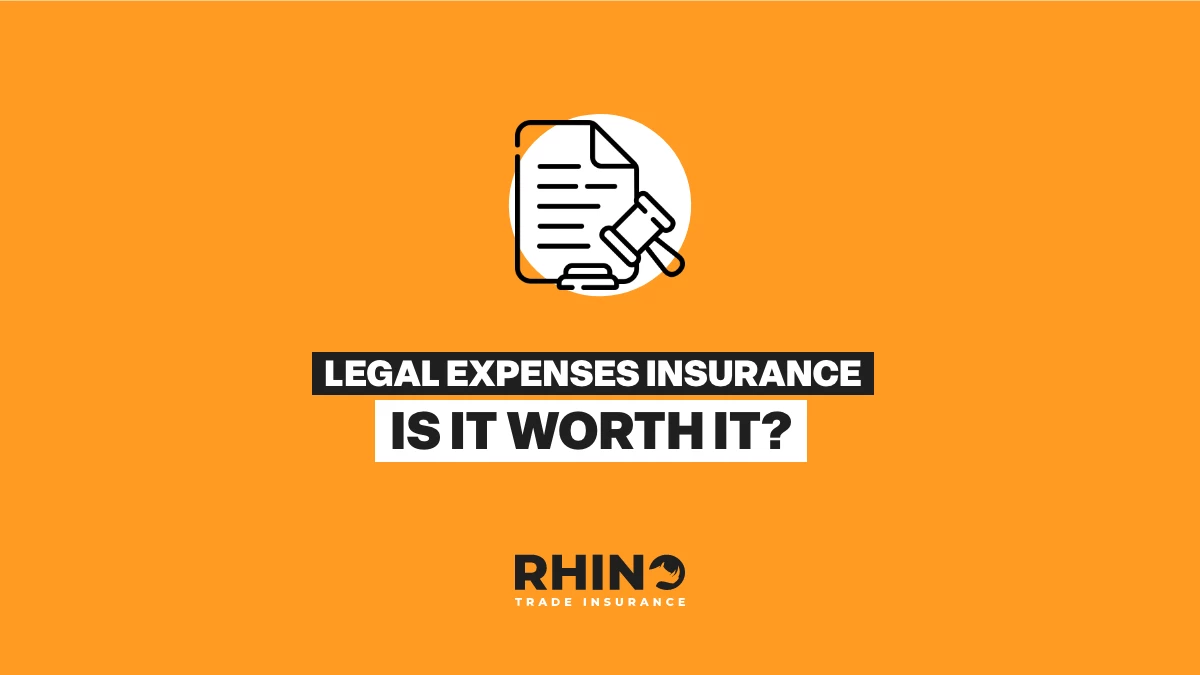
Legal Expenses Insurance – Is it Worth It?
Legal Expenses Insurance for tradespeople explained—what it covers, when you might need it, and how it protects against costly legal fees.
If you’re a subcontractor, Public Liability Insurance is just as important as your trusty set of tools. You may not need to lug your Public Liability cover around in a heavy box, but it’s every bit as essential as your tools and you shouldn’t turn up to a job without it.
Let’s take a look at Public Liability Insurance for subcontractors – what it is, why it’s important, and how to get it.
Public Liability Insurance is a type of insurance which protects the policyholder from the financial consequences of third-party liability claims being brought against them. These claims could be from a customer, another third party such as a supplier or inspector, or a member of the public unrelated to the job at hand.
The claim could either be for bodily injury – anything from a sprained ankle to accidental death – or property damage.
In most cases, yes. Even if the main contractor has Public Liability Insurance which extends to subcontractors, it’s unlikely to cover you for all the risks and hazards associated with your trade. Also, a claim might come to you directly and not via your contractor for your actions, so it’s always advised to have your own policy to be on the safe side.
Public Liability Insurance is so important because, without it, subcontractors would be on the hook for the expenses that inevitably come with a liability claim. Liability claims can be very costly, and even if the claim is on the smaller side, the unexpected expenditure of settling it can devastate the average subcontracting business.
Public Liability Insurance is also important because of the high likelihood of a third-party claim being brought. Subcontractors generally work in relatively dangerous environments, where bodily injury and property damage unfortunately happen on a regular basis. So, even though every self-employed person needs Public Liability Insurance to shield them from the cost of claims, subcontractors working in the trades are especially at risk due to the hazards they face.
As a result, Public Liability Insurance with the correct level of indemnity cover should be an essential component of any subcontractor’s risk management strategy, alongside robust on-the-job health & safety measures and regular tool and equipment maintenance.
One question we get asked all the time is, “Is Public Liability Insurance a legal requirement?”. The answer is no – unlike its close cousin Employer’s Liability Insurance, you won’t get fined by the Government if you work without Public Liability cover. However, just because it’s not the law, it doesn’t mean it wouldn’t be reckless and potentially financially crippling to skip the Public Liability Insurance.
Further, in the UK, you’re unlikely to get hired for any significant or lucrative work if you’re not fully insured with Public Liability Insurance. Any contractor worth their salt is going to want to see your Public Liability Insurance certificate straight off the bat, and certainly before they bring you onto a job.
Being uninsured as a subcontractor is the equivalent of wearing a sign saying, ‘If something happens on this job, I can’t afford to put it right!’. Not a good look if you want to work for reputable contractors and build a good reputation with your industry.
It’s important to remember that Public Liability Insurance only covers third parties and doesn’t cover the subcontractor themselves. So, if you are a subcontractor looking to protect yourself from the costs that personal bodily injury or damaged property will bring, then you’ll need to take out additional subcontractor insurance coverage.
For example, to protect yourself against the costs that a serious accident would mean for you, Personal Accident Insurance is what you need. This even covers you if you have an accident outside of work and provides a lump sum to help you through until you recover and can get back to work.
Income Protection Insurance is another key policy for subcontractors, as it pays out a monthly sum in the event that you are too injured or ill to work.
To protect your property and belongings while on the job, subcontractors should consider policies like Tools in Transit Insurance, Van Insurance and Gadget Insurance.
Finally, Public Liability Insurance doesn’t cover bodily injury or property damage to employees. So, it you’re a subcontractor who has hired employees then you’ll need Employer’s Liability Insurance by law to cover them.
When it comes to choosing the level of insurance you’ll need, there are a few factors to take into consideration.
The first is project requirements and contractual obligations - often there will be a stipulation that you’ll need a certain level of cover in place on a particular job. Check with the contractor in charge before taking on the job. Remember, you’ll take out coverage for 12 months, not on a per-job basis, so make sure it’s adequate for the jobs you’ll take during this time. It’s better to be over-insured than under-insured, so don’t skimp on your indemnity limit if you’ve got your eye on some larger jobs over the next year.
The second thing to consider is potential risks and liabilities. Things like working at height, working with heavy machinery and working with electricity, water or chemicals can all equal a riskier job and therefore a higher level of Public Liability cover is needed. In addition, working with high-value equipment or expensive materials will also affect the cover limit you’ll need.
Sound a little confusing? Don’t worry, you’re not alone in assessing and calculating risk. Rhino are the trade insurance experts, and we will happily assist when it comes to looking at the type of work you do and choosing a cover limit that suits you.
At Rhino, we deal with trade insurance all day long, so we’ve seen it all. Here are some of the most common mistakes we see subcontractors make when it comes to Public Liability Insurance.
Know your exclusions! It’s so important that you read the Policy Wording documents thoroughly to understand what you will and won’t be covered for. If you think you’re covered for something and you aren’t, it will be a nasty shock when it comes to making a claim. We’ve made our policies simple and transparent, but in case you’re still not sure about something then Rhino are always on hand to answer any of your quick-fire coverage questions.
Your quote is only as good as your current business situation. This is why we recommend that policyholders of Public Liability Insurance review their coverage requirements on a regular basis – let’s say quarterly – to make sure that they’re still adequately covered. For example, if you hire an employee, purchase a fancy new piece of equipment, or start to work at height then you’ll need to make sure your Public Liability Insurance coverage limit reflects these changes.
As a subcontractor, you spend your working life performing specialised work on behalf of contractors. You may have seen so many contracts in your time that you think you’ve seen it all, but you should read every new contract thoroughly in its entirety as there might be a stipulation about the required Public Liability Insurance limit that you could miss – and you don’t want to find out about it after an adverse event.
At Rhino Trade Insurance we have a range of insurance options for subcontractors. We know the nature of working as a self-employed contractor and can help you choose suitable cover and make sure you’re only paying for the insurance you actually need.
If you need any help understanding subcontractor Public Liability Insurance then Rhino are on hand six days a week to chat on the phone on 0116 350 1549, via email or over our live chat function. If you’d like to see what Public Liability coverage you might need, head to our online quote engine and enter a few details about your business to see a quote in seconds.
Legal Expenses Insurance for tradespeople explained—what it covers, when you might need it, and how it protects against costly legal fees.
Worried about a tax investigation? With HMRC cracking down in 2025, Tax Enquiry Insurance from Rhino gives UK tradespeople expert protection and peace of mind.
Rhino Trade Insurance CEO Troy Stevens joins industry leaders at the House of Commons to discuss the rising issue of tool theft—highlighting its impact on UK tradespeople and the importance of awareness and protection.
Tell us your trade and get a tailored insurance quote for your business in seconds
Our team of experts are available to talk to Mon-Fri 08.30-17.30 and Sat 10.00-14.00

